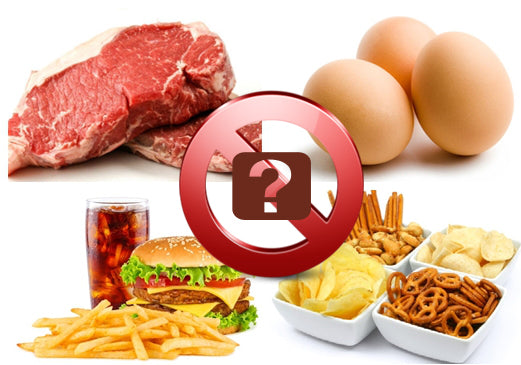There are many types of saturated fats, and lipid experts now understand that the body metabolizes each differently. In today’s post we’ll explore what it means when a fat is classified as saturated.
We’ll also take a look at the difference between types of saturated fats using real-world examples that illustrate exactly how they are metabolized by the body.
Finally, we’ll explain why coconut oil is a type of saturated fat that’s beneficial for heart health in pets and people.
What Are Saturated Fats?
All fats (lipids) are made of triglycerides – three individual molecules called fatty acids attached to a glycerol molecule. Fatty acids are made of chains of carbon atoms and can be distinguished by the length of their carbon chains.
When a chain of carbon atoms is fully connected with hydrogen atoms, it is considered a saturated fat. This means that it is “saturated” with hydrogen atoms.
The carbon atoms in a fat molecule are joined either by a single bond or double bond, depending on whether or not there is a hydrogen atom attached to it. Because saturated fats are fully loaded with a pair of hydrogen atoms, they have only single bonds in their carbon chain, making them more stable.
Saturated fats are found mainly in animal products such as red meat, poultry with skin, whole-milk dairy products, eggs, and tropical oils including coconut oil.

Types of Saturated Fats
It's important to understand that saturated fats are processed differently by the body depending on the length of the carbon chains in their fatty acids.
For this reason, they are classified into two primary categories: long-chain fats (long-chain triglycerides) and short and medium-chain fats (short-chain and medium-chain triglycerides). Both the length of carbon chain of the fatty acid, and the degree of hydrogen saturation determine the properties of a saturated fat and its effects on health.
Long-Chain Triglycerides
Saturated fats that come from animal protein (such as beef fat) are long-chain triglycerides (LCTs). These types of saturated fats are cholesterol-rich, and have been directly linked to a higher risk of heart disease. Saturated fats from animal protein are also atherogenic. Atherogenesis is a process in which fatty deposits form in the arteries, gradually constricting them.
The following example explains how LCTs are metabolized by the body:
A typical meal that’s packed full of long-chain triglycerides is a juicy steak and mashed potatoes with cream and butter. When you eat this meal, a series of events occur in your body…
- Long-chain fatty acids (LCFAs) are broken down by an enzyme called pancreatic lipase. The fats are then converted into small packets or globules of fats called chylomicrons.
- These chylomicrons are absorbed through the small intestines and travel through the lymphatic system and bloodstream. In animals, the absorption of chylomicrons increases serum triglycerides for 3-10 hours immediately after a meal.
- Once in the liver, the fats are further broken down by bile acids. They then either undergo beta oxidation, biosynthesis to cholesterol, or are repackaged as triglycerides.
- The triglycerides and cholesterol are then released back into the blood and transported to various other organs in the body.
This example illustrates why beef, cream, and butter increase blood lipid levels. In fact, long-chain triglycerides are the type of saturated fats that the American Heart Association (AHA) warns us about. This is because they are atherogenic and can contribute to the development of heart disease.
Medium-Chain Triglycerides
Medium-chain triglycerides (MCTs) differ from saturated animal and dairy fats (LCTs) in the way they are metabolized by the body. MCTs are rapidly absorbed in the intestines, even without pancreatic lipase. They are then carried by portal vein to the liver where they are rapidly oxidized to produce energy.
Here’s what happens when you eat coconut oil, an MCT that’s rich in beneficial medium-chain fatty acids including lauric acid and capric acid:
- The medium-chain fatty acids (MCFAs) in coconut oil are absorbed through the small intestines. They do not need pancreatic lipase for digestion.
- MCFAs then travel through the portal vein directly to the liver, instead of through the blood or lymphatic system. They do not get stored in fatty adipose tissues.
- The liver metabolizes the MCFAs without the need for bile acids, and releases it as energy. This is why coconut oil is considered a thermogenic oil!
This example illustrates why coconut oil does not increase blood lipid levels or result in atherogenesis. What’s more, far from actually contributing to the development of heart disease, coconut oil is actually very beneficial for heart health.
Why Coconut Oil Is Beneficial for Heart Health
Coconut oil is a saturated fat that’s obtained from the coconut tree. It is cholesterol-free (cholesterol is 0-14 parts per million), and consists predominantly of 65% MCFAs.
MCFAs are metabolized rapidly into energy in the liver, and do not participate in the biosynthesis and transport of cholesterol. In fact, coconut oil tends to raise HDL cholesterol (good cholesterol) and reduces the denser LDL cholesterol (bad cholesterol) that can be a threat to health.
Studies also show that coconut oil improves the overall cholesterol ratio (total cholesterol/HDL cholesterol) and reduces the risk of heart diseases.
There is a huge misconception that coconut oil is high in cholesterol and can increase cholesterol levels in the blood. For those concerned about coconut oil and cholesterol, let’s take a look at the cholesterol content in various fats:
Cholesterol Content in Fats
(cholesterol is measured in PPM or parts per million)
Coconut oil 0-14 (ppm)
Palm oil 18
Soybean oil 28
Corn oil 50
Butter 3,150
Lard 3,500
Wrapping Up
If you’d like more information about coconut oil and heart health, we highly recommend coconut oil expert Dr. Bruce Fife’s informative article, Coconut Oil Lowers Risk of Heart Disease, Stroke: Study Shows.
When feeding coconut oil to your family or pets, please be sure to choose a high-quality oil such as CocoTherapy coconut oil. Our therapeutic-grade oil has a high percentage of MCFAs which support the heart and provide numerous other health benefits.



